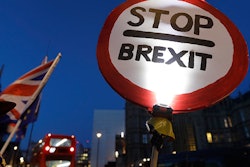LONDON (AP) — Pro-Brexit British lawmakers were mounting a campaign Monday to rescue Prime Minister Theresa May's rejected European Union divorce deal in a parliamentary showdown this week.
Lawmakers threw out May's Brexit deal two weeks ago and will debate and vote Tuesday on competing plans for what to do next about Britain's impending departure from the bloc.
May insists her agreement can still win parliament's backing, if it is tweaked to alleviate concerns about a provision for the Irish border. The measure, known as the backstop, would keep the U.K. in a customs union with the EU in order to remove the need for checks along the frontier between the U.K.'s Northern Ireland and EU member Ireland after Britain leaves the EU.
That border is crucial to the divorce deal because it will be the only land frontier between the U.K. and the EU after Brexit. Border checkpoints have disappeared since Ireland and Britain both became members of the EU single market in the 1990s and the 1998 Good Friday peace accord largely ended decades of violence in Northern Ireland.
Opposition to the backstop by pro-Brexit lawmakers — who fear it will trap Britain in regulatory lockstep with the EU — helped sink May's deal earlier this month. A new proposal submitted by Conservative legislator Graham Brady commits to backing May's deal if the backstop is replaced by "alternative arrangements."
Brady said if the motion was approved by Parliament, it would give May "enormous firepower" to go back to Brussels and renegotiate the Brexit divorce deal.
The government hopes to bring the deal back for a new vote in Parliament in February, with enough changes to reverse its thumping defeat on Jan. 15, when lawmakers rejected it by 432 votes to 202.
Some members of Parliament who voted against May's deal the first time say they would support it if the Irish backstop was removed.
Former Foreign Secretary Boris Johnson, a leading Brexiteer, said the prime minister was trying to secure a "freedom clause" that would ensure Britain could get out of the backstop. In his weekly Daily Telegraph column, Johnson said May would have "the whole country full-throatedly behind her" if she secured such a change.
But EU leaders insist they will not change the legally binding Brexit withdrawal agreement.
"This withdrawal agreement has been agreed with the U.K. government, it is endorsed by leaders and is not open for renegotiation," EU spokesman Margaritis Schinas said.
Irish Foreign Minister Simon Coveney said Sunday that Northern Ireland's peace process depended on avoiding the return of a hard border.
"That won't be easy, and those who misrepresent the backstop don't have an alternative to it," he said. "The EU has been clear that the backstop is an integral part of the withdrawal agreement."
Brady's backstop proposal is one of more than a dozen amendments proposed by U.K. lawmakers that aim to alter the course of Britain's departure. Some others seek to rule out a no-deal Brexit so Britain cannot tumble out of the bloc on March 29 without an agreement in place to cushion the shock.
Businesses say a no-deal Brexit would cause economic chaos by eliminating trade agreements and imposing tariffs, customs checks and other barriers between the U.K. and the EU, its biggest trading partner.
Speaker of the House of Commons John Bercow will announce Tuesday which amendments have been selected for debate and vote.
Conservative lawmaker Nick Boles, who is backing an amendment designed to rule out a no-deal Brexit and seek a delay to Britain's EU departure, said that Tuesday "is probably the only opportunity that Parliament is going to have to intervene in this process, to take control."
"If we don't seize the moment tomorrow afternoon, then we are at grave risk of just driving off the edge on March 29 without really wanting to and when there might be a compromise we could achieve, if we just had a few more months," he told the BBC.
___
Danica Kirka contributed to this story.






















